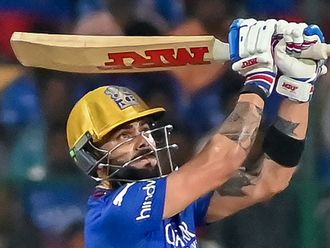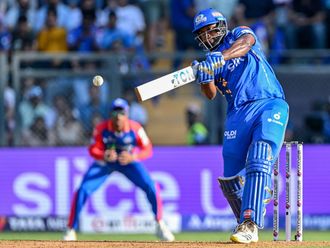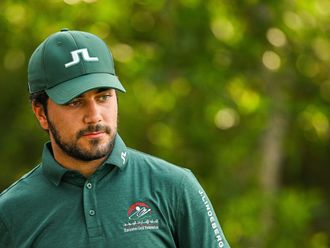London: When Bunny Austin, the last British man to reach the Wimbledon final in 1938, finished runner-up his prize was a £10 (Dh57) gift voucher from a London jeweller.
Seventy-four years on, Andy Murray has ended Britain’s long wait for a British finalist and is already guaranteed £575,000 for getting to Sunday’s showpiece where he will face Roger Federer.
Victory will double the size of the cheque and transform the Scot into a national hero, but it’s doubtful whether his life will be as colourful or controversial as Austin, who was born Henry Wilfred Austin on August 26, 1906.
Known affectionately as Bunny after a comic strip Pip, Squeak and Wilfred, Austin was a contemporary of Fred Perry, the last British man to win Wimbledon in 1936, and together they won four Davis Cups in the 1930s.
He also pioneered the wearing of shorts by tennis players instead of heavy, white flannel trousers.
“Fred Perry and I were playing doubles at Longwood [in Maryland], and it was terribly hot,” Austin told The Boston Globe newspaper in 1997.
“I came off the court in those sweat-soaked trousers feeling I was carrying an awfully lot of unnecessary weight below my knees. I’d been a football player in school and of course we wore shorts.
“Best thing for running. Why not for tennis? We went to New York for the singles at Forest Hills, and I bought a pair and wore them. I got a lot of kidding, but the wisdom of it was apparent.
“The next year, I introduced them at Wimbledon. I expected a fuss there, but there was none. Slowly, others followed. I don’t know why we put up with long flannel trousers for so long.”
Sadly for Austin, Wimbledon club officials did make a fuss over another matter which left him blackballed from the All England Club for 40 years.
In the 1930s, Austin had joined the Oxford Group, later known as Moral Re-Armament and toured the United States lecturing on Christianity and pacifism.
During the war, he was denounced as a draft-dodger although the truth was he was twice judged unfit for military service on medical grounds.
Despite that setback, he still served as a private in the United States Army Air Force from 1943 until 1945.
But his Wimbledon membership had been revoked and his attempts to regain entry were blocked by just one man on the All England Club committee, who it later emerged had carried a grudge against Austin for dropping him from the Cambridge University tennis team.
It was not until 1984 that he was allowed back into the club.
During his pomp, Austin shone on the court and off it.
He and his wife, the film star Phyllis Konstam, were regulars on the social circuit.
Austin even played tennis with Charlie Chaplin and met President Franklin Roosevelt.
He made an emotional return to Wimbledon in 2000 when he was brought onto Centre Court in a wheelchair for the parade of champions.
Austin died later that year on the day he celebrated his 94th birthday.
Meanwhile, on Friday, Austin’s son John said his late father’s advice to Murray would simply be “you have to win”.
“We’ve been waiting for someone to equal my father’s record for many years. We’re all quite excited,” said John Austin.
“I think he could win this year, Federer isn’t the player he was.”
John Austin will not be able to watch the final as he will be travelling, but added: “Obviously we’re all rooting for Murray.
“I’m quite keen for Murray to win, or for us to have a British champion again, before I pass away.”












